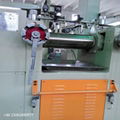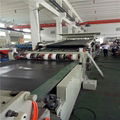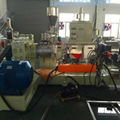| Model: | JS20-95 |
|---|---|
| Brand: | Nine delong |
| Origin: | Made In China |
| Category: | Industrial Supplies / Rubber & Plastics Machine |
| Label: | PE granulator , cable granulator , pelletizing machine |
| Price: |
US $108484
/ set
|
| Min. Order: | 1 set |
| Last Online:29 Aug, 2018 |
Polyethylene (PE), a thermoplastic, is one of the most popular plastics in use today with production in the billions of pounds each year. In both its low density (LDPE) and high density form (HDPE), it is widely used for the manufacture of extruded products.
Most LDPE and HDPE grades have excellent chemical resistance; they readily withstand attack by strong acids or strong bases. Polyethylene is also resistant to gentle oxidants and reducing agents.
High density polyethylene (HDPE) is characterized by good tensile strength, rigidity, impact-, wear- and chemical-resistance. It is harder than LDPE and can withstand somewhat higher temperatures (248°F for short periods, 230°F continuously). Because of its rigid nature, HDPE lends itself well to plastic profiles and is often used for food product containers, chemical containers, bottles, toys, automobile parts, trays, cutting boards, garbage containers, pipe fittings and tanks
Low density polyethylene (LDPE) is characterized by a lower tensile strength than HDPE but has increased ductility. It is more flexible than HDPE due to its lower crystallinity. LDPE can withstand temperatures of up to 176° and retains toughness and pliabilty over a wide temperature range. It is translucent and is resistant to many different chemicals. LDPE's flexible nature lends itself to plastic film wrap and plastic bags, but it can also be extruded into such products as plastic bottles and tubing.
HDPE and LDPE are just two of the many common and advanced thermoplastics resins that HPE is capable of extruding. Others include flexible and rigid PVC and polypropylene, and innovative engineering resins, such as ABS/PVC alloys and difficult-to-run elastomers, such as Santoprene, nylon and glass-filled ABS.











